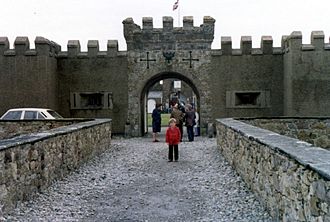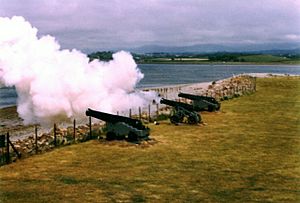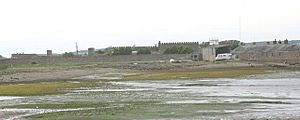Fort Belan facts for kids
Quick facts for kids Fort Belan |
|
|---|---|
 |
|
| General information | |
| Location | Dinlle Peninsula, Llanwnda |
| Town or city | Gwynedd |
| Country | Wales |
| Coordinates | 53°07′21″N 4°19′58″W / 53.12239°N 4.33269°W |
| Completed | 1775 |
| Cost | £30,000 |
| Design and construction | |
| Architect | Thomas Wynn, 1st Baron Newborough |
Fort Belan (pronounced: Bell-ann) is a strong coastal fortress in North Wales. It sits across from Abermenai Point, at the very end of the Menai Strait. You can find it on the coast of Gwynedd, in the area of Llanwnda.
The fort is located on the tip of the Dinlle Peninsula. This is the windy, most north-western part of the Welsh mainland. The fort gets cut off from the land twice a day when the tide comes in. Fort Belan is important because of its location. It acts as a gateway to both the north Wales coast and to Liverpool, England.
History of Fort Belan
The fort was built in 1775. It cost about £30,000, which would be like £3.7 million today. Thomas Wynn built it. He was a Member of Parliament (MP) for Caernarfonshire at the time. Later, he became Lord Newborough, which is a type of noble title.
Wynn was worried about Britain's coast being attacked. This was especially true because of the American War of Independence happening then. This war was when the American colonies fought for their freedom from Britain. Fort Belan was the only fort built specifically for the American Revolution on the European side of the Atlantic Ocean. It was made to guard a narrow passage of water, only about 35 meters (115 feet) wide.
In the late 1780s, the fort's living quarters, called barracks, were used. They helped protect against American privateers who were raiding ships in the Irish Sea. Privateers were like armed ships allowed by a government to attack enemy ships. Even with its military past, no shots have ever been fired in anger from Fort Belan.
In the 1820s, the Wynn family changed the fort. They made it into their own private fort. They even added a small harbor for Spencer Wynn's steam yacht. A lot of building work happened between 1824 and 1826. Freddie Wynn built the watchtower in the 1890s. It had a telescope inside.
In 1907, a man named Sir Ralph Frankland-Payne-Gallwey visited. He wrote about seeing a dock, workshops for fixing boats, and places to store marine supplies. During World War II, the fort was used by the military again. It became a base for the Home Guard and two rescue boats. In the 1950s, Colonel Robert Vaughan Wynn owned it. The Wynn family sold the fort in 1992 to the Blundell family. They wanted to use it for studying marine biology. In 1996, Fort Belan was named a Grade I listed building. This means it's a very important historic building.
Fort Belan's Architecture
The buildings inside the fort are a bit taller than the stone walls. These walls are about 20 feet (6 meters) high. In the middle of the fort is a sheltered square area called a quadrangle. At one time, there were even peacocks living there!
Strong towers are at each end of the courtyard. Each tower has the symbol of a two-headed eagle. This was the symbol of the first Lord Newborough. Small two-story houses line the sides of the fort. These were used as living quarters for officers and soldiers. About 24 cannons are set up along the walls, forming a gun battery.
Fort Belan Today
Fort Belan used to have a maritime museum and a pottery shop. Now, it has been changed into a place where people can stay for holidays. It's a self-catering complex, meaning you cook your own meals. The houses have a cozy farmhouse feel, and coal fires keep them warm. Famous guests who have stayed overnight include Princess Margaret. She stayed there for the special event when Prince Charles was invested in 1969.
See also
 In Spanish: Fort Belan para niños
In Spanish: Fort Belan para niños
 | Leon Lynch |
 | Milton P. Webster |
 | Ferdinand Smith |



